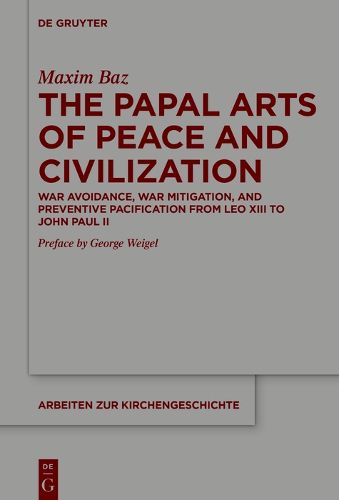Readings Newsletter
Become a Readings Member to make your shopping experience even easier.
Sign in or sign up for free!
You’re not far away from qualifying for FREE standard shipping within Australia
You’ve qualified for FREE standard shipping within Australia
The cart is loading…






The twentieth century saw a transformation in the Catholic Church's approach to war and peace, as the papacy sought to adopt and propose alternatives to traditional Just War doctrine by developing contemporary policies to peacefully resolve both the symptoms and root causes of war. This book explores the emergence of a new ethical framework, built upon three distinct moral doctrines, coined here as AMP: War Avoidance, for when war is imminent; War Mitigation, for when war is unavoidable; and Preventive Pacification, during periods of relative stability. This book examines the shaping of the AMP paradigm from Leo XIII to John Paul II, analyzing its theological, philosophical, and legal underpinnings. While AMP co-exists alongside Just War doctrine, the latter provides a framework for judging the morality of war, the former addresses the preemption, mitigation, and prevention of conflict. The book argues that AMP gradually became the primary framework for the Holy See's foreign policy with the potential to further become a crucial ethical guide for the twenty-first century's pursuit of more just and peaceful international relations.
$9.00 standard shipping within Australia
FREE standard shipping within Australia for orders over $100.00
Express & International shipping calculated at checkout
The twentieth century saw a transformation in the Catholic Church's approach to war and peace, as the papacy sought to adopt and propose alternatives to traditional Just War doctrine by developing contemporary policies to peacefully resolve both the symptoms and root causes of war. This book explores the emergence of a new ethical framework, built upon three distinct moral doctrines, coined here as AMP: War Avoidance, for when war is imminent; War Mitigation, for when war is unavoidable; and Preventive Pacification, during periods of relative stability. This book examines the shaping of the AMP paradigm from Leo XIII to John Paul II, analyzing its theological, philosophical, and legal underpinnings. While AMP co-exists alongside Just War doctrine, the latter provides a framework for judging the morality of war, the former addresses the preemption, mitigation, and prevention of conflict. The book argues that AMP gradually became the primary framework for the Holy See's foreign policy with the potential to further become a crucial ethical guide for the twenty-first century's pursuit of more just and peaceful international relations.